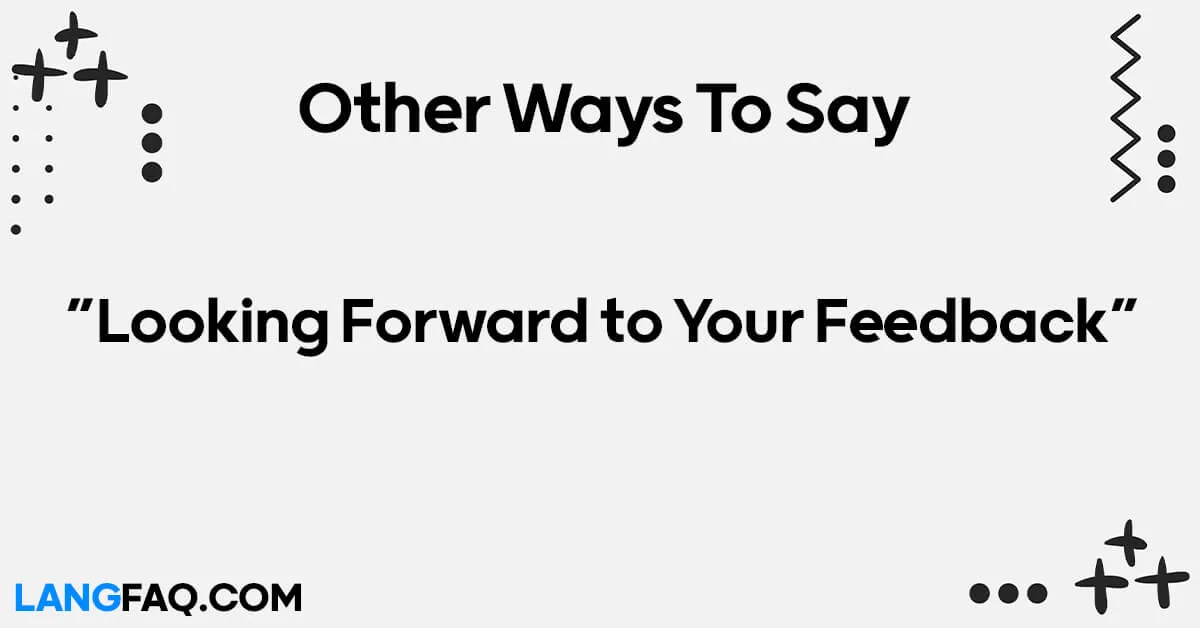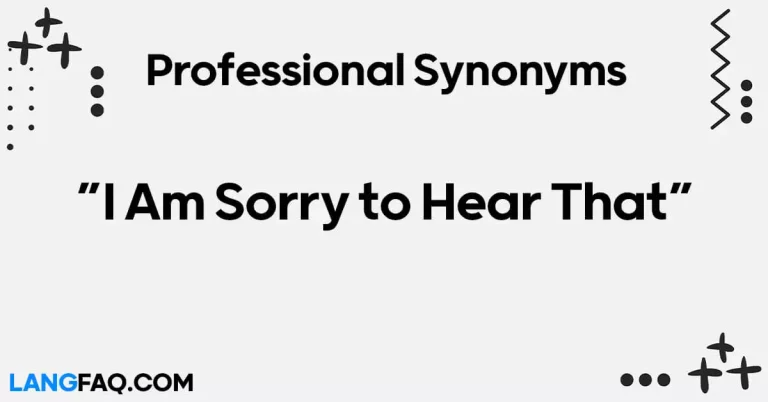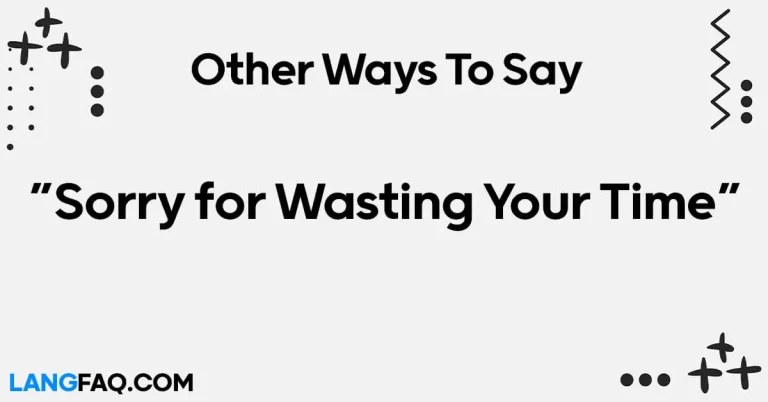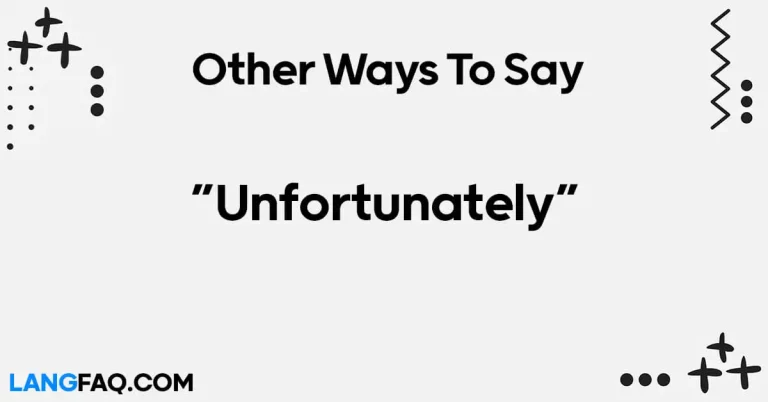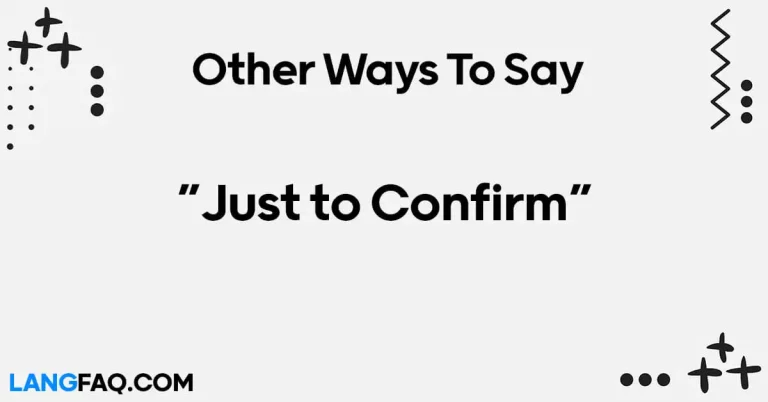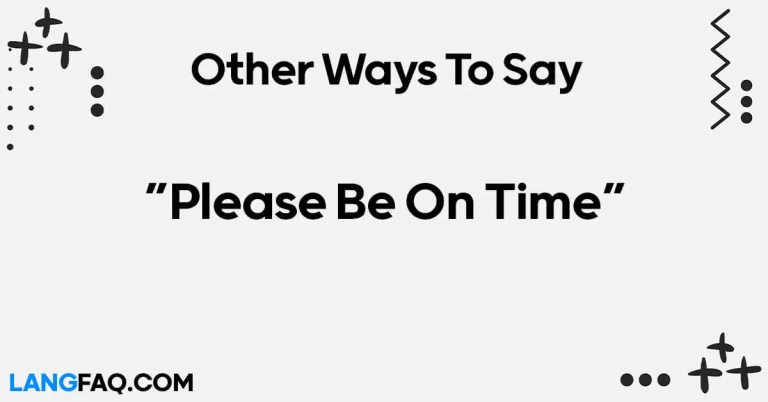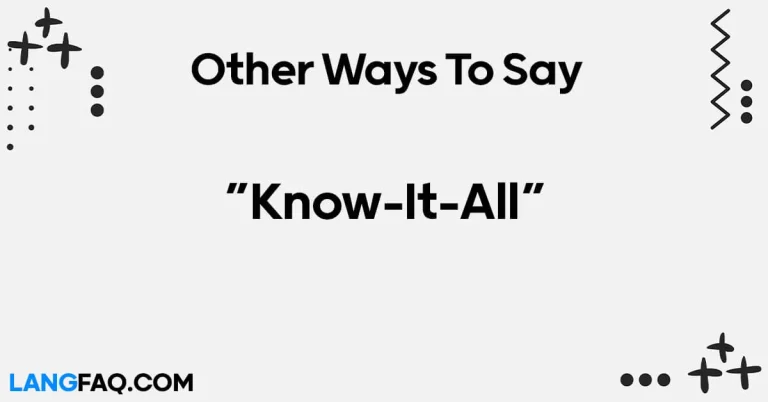Effective communication is the cornerstone of successful collaboration, and expressing anticipation for feedback is no exception. In this article, we will delve into 12 alternative ways to convey the same sentiment as “Looking Forward to Your Feedback.” Enhance your communication repertoire and foster positive interactions in both personal and professional settings.
12 Other Ways to Say “Looking Forward to Your Feedback”
Here are 12 alternative ways to express “Looking Forward to Your Feedback”:
- Eagerly Awaiting Your Input
- Anticipating Your Valuable Insights
- Can’t Wait to Hear Your Thoughts
- Anxiously Awaiting Your Response
- Excited to Receive Your Feedback
- Yearning for Your Observations
- Looking Forward to Your Valued Opinion
- Ready and Waiting for Your Feedback
- Enthusiastically Awaiting Your Comments
- Patiently Awaiting Your Input
- Thrilled to Get Your Perspective
- Keenly Waiting for Your Feedback
Here’s a table with meanings and examples for the 12 alternative ways to express “Looking Forward to Your Feedback”:
| Expression | Meaning | Example |
|---|---|---|
| Eagerly Awaiting Your Input | Expressing enthusiasm and anticipation | “I’m eagerly awaiting your input on the upcoming project.” |
| Anticipating Your Valuable Insights | Looking forward to valuable perspectives | “Anticipating your valuable insights on the market trends.” |
| Can’t Wait to Hear Your Thoughts | Conveying excitement about receiving thoughts | “I can’t wait to hear your thoughts on the latest proposal.” |
| Anxiously Awaiting Your Response | Expressing a sense of urgency | “Anxiously awaiting your response to the time-sensitive matter.” |
| Excited to Receive Your Feedback | Showing genuine excitement | “I’m excited to receive your feedback on the new product launch.” |
| Yearning for Your Observations | Expressing a poetic sense of anticipation | “Yearning for your observations on the beauty of the presentation.” |
| Looking Forward to Your Valued Opinion | Emphasizing the importance of the opinion | “Looking forward to your valued opinion on the strategic plan.” |
| Ready and Waiting for Your Feedback | Conveying preparedness and anticipation | “I’m ready and waiting for your feedback on the project updates.” |
| Enthusiastically Awaiting Your Comments | Expressing excitement about receiving comments | “Enthusiastically awaiting your comments on the draft proposal.” |
| Patiently Awaiting Your Input | Demonstrating composure and anticipation | “Patiently awaiting your input on the team’s performance.” |
| Thrilled to Get Your Perspective | Conveying excitement about gaining perspective | “Thrilled to get your perspective on the industry trends.” |
| Keenly Waiting for Your Feedback | Highlighting keen interest in the feedback | “Keenly waiting for your feedback on the customer survey results.” |
These diverse expressions provide a range of ways to convey anticipation for feedback, allowing you to tailor your communication to various contexts and relationships. Experimenting with these alternatives can enhance the dynamism and engagement of your interactions.
Is It Correct to Say “Looking Forward to Your Feedback”?
Absolutely! “Looking Forward to Your Feedback” is a commonly used and perfectly correct phrase in English. It conveys a positive and anticipatory tone, expressing your eagerness to receive input, comments, or opinions from the recipient. This phrase is widely used in professional, academic, and casual settings.
Example in Professional Context: “Dear [Recipient],
I hope this email finds you well. As we near the completion of our project, I am looking forward to your feedback on the recent developments. Your insights are crucial to the success of our endeavor, and I value your opinion.
Best regards, [Your Name]
Example in Casual Setting: “Hi [Friend],
I shared the draft of my short story with you, and I’m really looking forward to your feedback. Let me know what you think and any suggestions you might have.
Cheers, [Your Name]
Professional Mail Example With “Looking Forward to Your Feedback”
Certainly! Here’s an example of a professional email using the phrase “Looking Forward to Your Feedback”:
Subject: Project Proposal Review
Dear [Recipient’s Name],
I trust this email finds you well. As part of our ongoing efforts to enhance our project strategies, I am pleased to share with you the latest version of the project proposal for [Project Name].
Please find the attached document, which incorporates the feedback and suggestions gathered during our previous discussions. Your expertise in [relevant area] is highly valued, and your insights will undoubtedly contribute to the refinement of our proposal.
I understand that your schedule is busy, and I appreciate the time you will take to review the document. Your feedback, whether it’s related to the overall strategy or specific details, is crucial for ensuring the success of this project.
Please feel free to share your thoughts by [insert deadline, if applicable]. If you have any questions or require additional information, I am at your disposal.
Thank you in advance for your time and consideration. Looking forward to your feedback and the opportunity to discuss any recommendations you may have.
Best regards,
[Your Full Name] [Your Position] [Your Company] [Your Contact Information]
Eagerly Awaiting Your Input
In the realm of professional communication, expressing eagerness can enhance collaboration and demonstrate a proactive stance. “Eagerly Awaiting Your Input” is a versatile phrase suitable for various contexts, emphasizing enthusiasm for the recipient’s contribution.
Scenario:
Imagine you’re working on a team project, and you need your colleague’s insights for a critical decision. Using this phrase in an email conveys your anticipation and emphasizes the value you place on their input.
Example:
“Dear [Colleague’s Name],
I hope this email finds you well. We are currently in the final stages of the project, and I am eagerly awaiting your input on the budget allocation. Your insights are crucial for our success, and I believe your perspective will greatly contribute to the project’s overall quality.
Looking forward to your thoughts!
Best regards,
[Your Name]*
Variations:
- Colleague Relationship: “Eagerly Awaiting Your Professional Input”
- Mentor-Mentee Context: “Eagerly Awaiting Your Guidance”
Dictionary Insight:
The term “eager” is derived from Old French, meaning “keen or ardent desire.” It reflects a positive, forward-looking attitude.
Usage Tip:
Use this phrase when you want to convey excitement while maintaining professionalism, making it ideal for scenarios where enthusiasm is well-received.
Anticipating Your Valuable Insights
Anticipation coupled with recognition of the value placed on someone’s input can foster a positive collaborative environment. “Anticipating Your Valuable Insights” is perfect when seeking perspectives that hold significance.
Scenario:
In a formal business meeting, expressing anticipation for a colleague’s insights can set a positive tone and emphasize the importance of their contribution.
Example:
“Good morning [Team],
As we approach the upcoming strategy session, I find myself anticipating your valuable insights on the market trends. Your expertise in this area is invaluable, and I believe your perspective will greatly influence our strategic decisions. Looking forward to our fruitful discussion.
Best regards, [Your Name]*
Variations:
- Friendship Context: “Anticipating Your Valuable Thoughts”
- Formal Presentation: “Anticipating Your Valuable Analysis”
Dictionary Insight:
“Anticipate” comes from the Latin word “anticipare,” meaning “to take before.” It implies looking forward to something with foresight.
Usage Tip:
Employ this phrase when acknowledging the significance of the insights you are about to receive, fostering a sense of collaboration and mutual respect.
Can’t Wait to Hear Your Thoughts
Injecting a casual tone into professional communication can make it more approachable. “Can’t Wait to Hear Your Thoughts” does just that, conveying excitement in a friendly manner.
Scenario:
Imagine you’re working on a project with a close-knit team. Using this phrase in a casual meeting sets a positive atmosphere and encourages open communication.
Example:
“Hey team,
Can’t wait to hear your thoughts on the new client proposal during our meeting tomorrow. I know everyone’s input will be valuable, and I’m genuinely looking forward to our discussion.
Cheers, [Your Name]*
Variations:
- Colleague Collaboration: “Can’t Wait to Hear Your Professional Thoughts”
- Casual Setting: “Can’t Wait to Hear Your Take”
Dictionary Insight:
The use of “can’t wait” adds a sense of immediacy and excitement, making it an ideal choice for expressing eagerness.
Usage Tip:
Employ this phrase in informal settings or with colleagues you have a close relationship with, ensuring it aligns with the overall tone of the conversation.
Anxiously Awaiting Your Response
In situations demanding urgency, expressing anxiety can effectively communicate the pressing nature of the feedback sought. “Anxiously Awaiting Your Response” conveys a sense of eagerness mixed with a recognition of the time sensitivity.
Scenario:
Consider you’ve sent a proposal for an upcoming project, and a swift response is crucial. Using this phrase in an email adds urgency while maintaining professionalism.
Example:
“Dear [Client’s Name],
I trust this email finds you well. I am anxiously awaiting your response to the proposal we sent last week. Your insights are integral to the project’s progression, and your timely feedback will significantly impact our next steps. Looking forward to hearing from you soon.
Best regards, [Your Name]*
Variations:
- Formal Setting: “Anxiously Awaiting Your Timely Response”
- Colleague Interaction: “Anxiously Awaiting Your Input”
Dictionary Insight:
“Anxious” originates from the Latin word “anxius,” meaning “troubled in mind.” It conveys a state of eager anticipation combined with concern.
Usage Tip:
Use this phrase when time is of the essence, ensuring the recipient understands the urgency without compromising professionalism.
Excited to Receive Your Feedback
Adding a positive spin to your anticipation can create an engaging and optimistic tone. “Excited to Receive Your Feedback” communicates genuine enthusiasm about the incoming perspectives.
Scenario:
Imagine you’ve collaborated on a creative project, and feedback is imminent. Using this phrase in an email conveys not only anticipation but also excitement about the possibilities.
Example:
“Hi [Collaborator’s Name],
I hope you’re doing well. I’m excited to receive your feedback on the latest draft of our project. Your insights always elevate our work, and I can’t wait to see how we can make it even better together.
Best, [Your Name]*
Variations:
- Professional Context: “Excited to Receive Your Professional Feedback”
- Personal Project: “Excited to Get Your Input”
Dictionary Insight:
“Excited” comes from the Latin word “excitare,” meaning “to call forth or produce.” It conveys a heightened emotional state.
Usage Tip:
Infuse positivity into your communication by using this phrase, especially when expecting feedback on creative or collaborative projects.
Yearning for Your Observations
For a touch of poetic flair, “Yearning for Your Observations” blends anticipation with a sense of longing and curiosity. This alternative adds a layer of expressiveness to your communication.
Scenario:
In a creative setting where artistic expression is valued, expressing yearning can evoke a shared passion for the project.
Example:
“Dear [Creative Team],
As we approach the final stages of our artistic endeavor, I find myself yearning for your observations on the visual aesthetics. Your unique perspectives have always added a special touch, and I can’t wait to see how your insights will elevate our work.
Warm regards, [Your Name]*
Variations:
- Artistic Collaboration: “Yearning for Your Artistic Observations”
- Friendship Context: “Yearning for Your Unique Insights”
Dictionary Insight:
“Yearning” implies a deep, heartfelt desire and conveys a sense of emotional attachment.
Usage Tip:
Employ this phrase in settings that appreciate a more expressive and emotionally resonant communication style, fostering a sense of shared passion.
Looking Forward to Your Valued Opinion
Elevating your language can demonstrate a higher regard for the recipient’s viewpoint. “Looking Forward to Your Valued Opinion” emphasizes not just anticipation but also the significance placed on the opinion sought.
Scenario:
In a professional setting where diverse perspectives contribute to decision-making, expressing a desire for a valued opinion enhances collaboration.
Example:
“Hello [Team],
As we delve into strategic planning, I am looking forward to your valued opinion on the proposed initiatives. Your insights carry immense weight, and I believe your perspective will play a pivotal role in shaping our direction. Excited to hear from you.
Best regards, [Your Name]*
Variations:
- Expertise Acknowledgment: “Looking Forward to Your Expert Opinion”
- Team Collaboration: “Looking Forward to Your Team’s Collective Opinion”
Dictionary Insight:
“Valued” denotes something highly regarded or esteemed, emphasizing the importance assigned to the opinion.
Usage Tip:
Use this phrase when seeking opinions that significantly contribute to decision-making processes, underscoring the esteem in which you hold the recipient’s viewpoint.
Ready and Waiting for Your Feedback
Cutting straight to the point can convey a proactive stance. “Ready and Waiting for Your Feedback” communicates preparedness and a sense of immediacy, showcasing your readiness to receive and act upon the feedback.
Scenario:
In a dynamic work environment where quick responses are essential, expressing readiness emphasizes efficiency and responsiveness.
Example:
“Hi [Recipient],
I trust this email finds you well. I wanted to let you know that I am ready and waiting for your feedback on the latest project update. Your insights are crucial for our next steps, and I’m eager to incorporate your suggestions promptly.
Best, [Your Name]*
Variations:
- Formal Setting: “Ready and Waiting for Your Professional Feedback”
- Team Collaboration: “Ready and Eager for Your Team’s Feedback”
Dictionary Insight:
“Ready” implies a state of preparedness, suggesting prompt action.
Usage Tip:
Employ this phrase when emphasizing a proactive approach to feedback, indicating your readiness to implement suggested changes swiftly.
Enthusiastically Awaiting Your Comments
Expressing boundless enthusiasm can add energy to your communication. “Enthusiastically Awaiting Your Comments” is a vibrant alternative, conveying excitement about the upcoming exchange of ideas.
Scenario:
In a creative or collaborative setting where vibrant and energetic communication is encouraged, expressing enthusiasm sets a positive tone.
Example:
“Hey [Team],
Our brainstorming session is just around the corner, and I am enthusiastically awaiting your comments on the proposed concepts. Your creativity is always inspiring, and I can’t wait to see the exciting ideas you bring to the table.
Cheers, [Your Name]*
Variations:
- Team Spirit: “Enthusiastically Awaiting Your Team’s Comments”
- Informal Collaboration: “Super Excited for Your Comments”
Dictionary Insight:
“Enthusiastically” conveys a heightened state of excitement, adding vibrancy to your expression.
Usage Tip:
Use this phrase when a lively and dynamic communication style is appropriate, fostering an atmosphere of energetic collaboration.
Patiently Awaiting Your Input
Demonstrating composure while expressing anticipation is essential in scenarios requiring patience. “Patiently Awaiting Your Input” conveys a composed demeanor while highlighting your eagerness for the recipient’s contribution.
Scenario:
In situations where thoughtful consideration is crucial, expressing patience underscores your understanding of the time required for a well-thought-out response.
Example:
“Dear [Recipient],
I hope this email finds you in good spirits. As we navigate through the complexities of the project, I am patiently awaiting your input on the proposed changes. Your thorough analysis is always valued, and I appreciate the time you take to provide thoughtful insights.
Best, [Your Name]*
Variations:
- Professional Context: “Patiently Awaiting Your Professional Input”
- Mentor-Mentee Relationship: “Patiently Awaiting Your Guidance”
Dictionary Insight:
“Patiently” stems from the Latin word “patientia,” meaning “suffering or enduring.” It conveys the ability to wait calmly.
Usage Tip:
Use this phrase when emphasizing the importance of thoughtful consideration and acknowledging the time required for a well-informed response.
Thrilled to Get Your Perspective
Infusing excitement into your anticipation can make your communication more engaging. “Thrilled to Get Your Perspective” communicates not just expectation but a genuine thrill at the prospect of gaining a fresh perspective.
Scenario:
In a creative or collaborative setting where diverse viewpoints are valued, expressing thrill adds a positive and dynamic tone.
Example:
“Hello [Collaborator],
I trust you’re well. As we approach our strategy meeting, I am thrilled to get your perspective on the market dynamics. Your unique insights always bring a fresh angle to our discussions, and I can’t wait to see the impact they’ll have this time.
Best, [Your Name]*
Variations:
- Formal Setting: “Thrilled to Get Your Professional Perspective”
- Casual Collaboration: “Totally Thrilled for Your Perspective”
Dictionary Insight:
“Thrilled” conveys a state of excitement and pleasure, adding a positive connotation to your expression.
Usage Tip:
Use this phrase when seeking perspectives that bring excitement and a new dimension to the discussion, fostering a positive and dynamic atmosphere.
Keenly Waiting for Your Feedback
Highlighting your keen interest in the recipient’s thoughts can add a personal touch to your communication. “Keenly Waiting for Your Feedback” emphasizes attentiveness and genuine curiosity.
Scenario:
In professional relationships where a personal touch is valued, expressing keen interest adds warmth to your communication.
Example:
“Hi [Recipient],
I hope you’re doing well. I’m keenly waiting for your feedback on the project proposal. Your thoughts always provide valuable insights, and I’m eager to hear how we can refine our approach based on your perspective.
Best regards, [Your Name]*
Variations:
- Close Colleague Relationship: “Keenly Waiting for Your Input”
- Mentor-Mentee Connection: “Keenly Waiting for Your Guidance”
Dictionary Insight:
“Keenly” reflects a high degree of interest or enthusiasm, conveying a sense of attentiveness.
Usage Tip:
Use this phrase when seeking feedback in professional relationships where a personal touch is appropriate, demonstrating genuine curiosity and attentiveness.
Frequently Asked Questions
Q: Are these alternatives suitable for professional communication? Absolutely, these alternatives maintain a professional tone while adding variety and nuance to your language.
Q: Can I use these expressions in written communication? Certainly, these alternatives are versatile and can be seamlessly integrated into both verbal and written communication.
Q: How do I choose the most appropriate alternative for a given situation? Consider the context and your relationship with the recipient. Opt for expressions that align with the tone and formality of the communication.
Q: Are there cultural considerations when using these alternatives? While these alternatives are generally universal, it’s essential to be mindful of cultural nuances and preferences in your communication.
Q: Can I mix and match these alternatives in a single communication? While it’s advisable to maintain consistency, judicious use of these alternatives can add flair to your expressions without being overwhelming.
Q: Should I use these alternatives in professional emails? Certainly, these alternatives can enhance the tone of your professional emails, making them more engaging and dynamic.
Conclusion
Effective communication is an art, and mastering the art involves exploring diverse expressions. The 12 alternatives presented here offer a spectrum of ways to convey anticipation for feedback. Experiment with these phrases, and watch as your communication becomes more engaging, dynamic, and nuanced.

